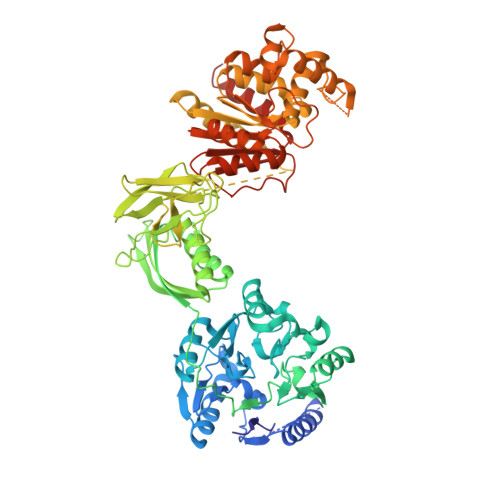Crystal structures and biochemical analyses of the bacterial arginine dihydrolase ArgZ suggests a "bond rotation" catalytic mechanism.
Zhuang, N., Zhang, H., Li, L., Wu, X., Yang, C., Zhang, Y.(2020) J Biol Chem 295: 2113-2124
- PubMed: 31914412
- DOI: https://doi.org/10.1074/jbc.RA119.011752
- Primary Citation of Related Structures:
6JUY, 6JUZ, 6JV0, 6JV1 - PubMed Abstract:
A recently discovered ornithine-ammonia cycle (OAC) serves as a conduit in the nitrogen storage and remobilization machinery in cyanobacteria. The OAC involves an arginine catabolic reaction catalyzed by the arginine dihydrolase ArgZ whose catalytic mechanism is unknown. Here we determined the crystal structures at 1.2-3.0 Å of unliganded ArgZ from the cyanobacterium Synechocystis sp. PCC6803 and of ArgZ complexed with its substrate arginine, a covalently linked reaction intermediate, or the reaction product ornithine. The structures reveal that a key residue, Asn 71 , in the ArgZ active center functions as the determinant distinguishing ArgZ from other members of the guanidino group-modifying enzyme superfamily. The structures, along with biochemical evidence from enzymatic assays coupled with electrospray ionization MS techniques, further suggest that ArgZ-catalyzed conversion of arginine to ornithine, ammonia, and carbon dioxide consists of two successive cycles of amine hydrolysis. Finally, we show that arginine dihydrolases are broadly distributed among bacteria and metazoans, suggesting that the OAC may be frequently used for redistribution of nitrogen from arginine catabolism or nitrogen fixation.
Organizational Affiliation:
Key Laboratory of Synthetic Biology, Chinese Academy of Sciences Center for Excellence in Molecular Plant Sciences, Shanghai Institute of Plant Physiology and Ecology, Chinese Academy of Sciences, Shanghai 200032, China.














